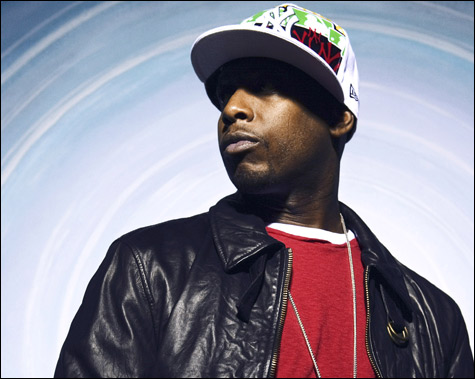
“When I first started off, I never thought of this as a career — I just wanted to rhyme.” |
If one hip-hop album crystallized the schism between underground authenticity and mainstream monotony, it was Mos Def and Talib Kweli Are Black Star (Rawkus). In addition to unprecedented intellectual miracles like “Definition” and “Respiration,” the release packed cuts such as “Hater Players” that pegged the sentiments of rap purists. For those of us who followed the subterranean gospel of Mos and Kweli, interest in Jay-Z and comparable materialistic contemporary nonsense faded quicker than Ja Rule.
Save for featuring Justin Timberlake on his last release, Kweli never compromised his craft to rise above the underground, and yet he became one of hip-hop’s elite few bling-free mainstream rappers. Even while evolving as an artist and an entrepreneur, he’s remained the same Brooklyn cat who reaches “past the star status that you’re grabbing at,” and whose “battle raps blast your ass back to your natural habitats.” I caught Kweli by phone from Miami — where he’s on tour with his live back-up band, the Rhythm Roots All Stars — to see how it feels to be (what often seems like) the lone black star shining in an abyss of mediocrity.

There’s been a lot of talk that the success of your most recent disc, last year’s Eardrum, which debuted at #2 on Billboard’s album chart, was the long-awaited proof that sincere hip-hop can sell. Is that how you saw it?
That’s definitely my view, but, to be more of a realist, my success comes gradually with every album. I consistently move up on the charts, and I consistently sell more units. Not to take anything away from myself, but because the industry is tanking so fast, it makes my success look a lot bigger than it is. It exposes the myth that a lot of these other artists are so far away in numbers from guys like me.
You’re more than just an artist at this point, since you own Blacksmith Music. How has your role changed?
I’m still in the studio and on tour too much to have any office other than my laptop and my cellphone, but the difference is that this is a career for me now. When I first started off, I never thought of this as a career — I just wanted to rhyme. I just wanted people to think that I was nice.
When you, Mos Def, and Hi-Tek put out the Black Star album in 1998, did you realize the impact that it would have in pushing the looming rift between the underground and the mainstream?
When I put out those albums, there was nothing that represented me in mainstream hip-hop. I was still buying vinyl, going to the clubs, and listening to college radio. We had the right timing in that a lot of other people felt the same way, and Rawkus was able to make everything look a lot bigger than it was. It doesn’t work like that anymore.
What advice do you give up-and-coming MCs who pack enlightened messages and who are looking to reach audiences as large as you have?
At this stage you have to create your own niche and use the tools. You used to have to physically participate in the scene — I used to be in the parks and at the record stores. Now it’s completely different. I tell them to look at an artist like Consequence, who’s never been on a major label, but because of the Internet there’s not a kid out there who doesn’t know him.
Train of Thought is my favorite hip-hop album of all time, and i’ve heard a lot of other people say the same. What sort of magic was bouncing around in that studio between you and Hi-Tek?
The truth is that it was more than just magic — it was conflict. We come from different places, and we have different ideas. One thing we have in common, though, is a love for hip-hop, but we even argued about that a lot. There was a lot of back-and-forth nitpicking to make that album sound that real.
You mentioned this past year that there may be another reflection eternal album in the works. Given how much you and Hi-Tek have grown, what would that project come off like?
We signed the deal to do it, and I’m looking forward to finishing it.
Anything else you want to tell me about that?
Nah — not now — but we’ve already done a few songs.
I see your next solo album is called Prisoner of Conscious. Is the title self-explanatory, or is there more to it?
I mentioned that would be a cool title in an interview, but that’s not the title. I mean — it might be, but not yet. It’s a play on words, because being a prisoner of conscious is not necessarily a bad thing. People change in prison — sometimes for the better.